Unit 1 Back to School 单元复习课件(24张ppt)
文档属性
| 名称 | Unit 1 Back to School 单元复习课件(24张ppt) |
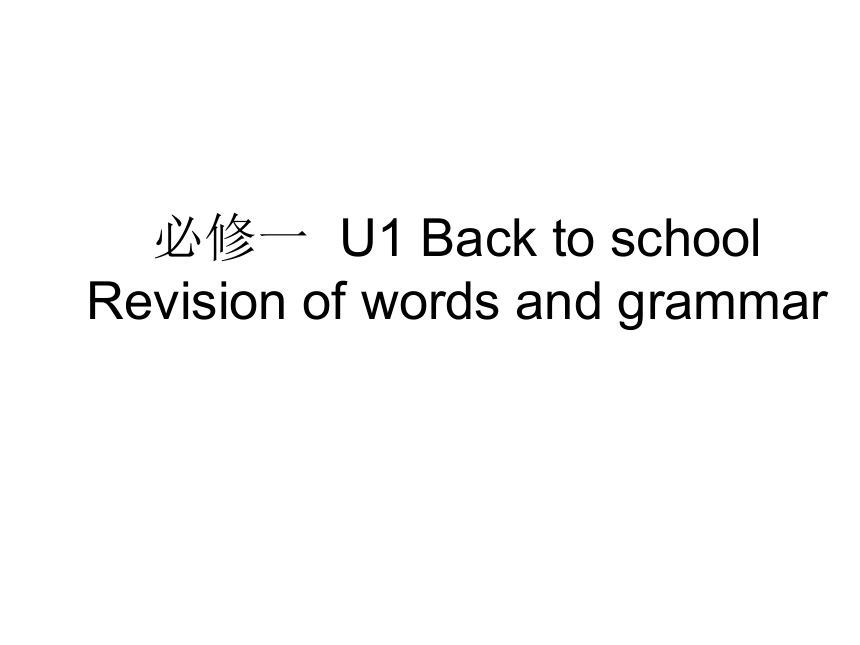
|
|
| 格式 | zip | ||
| 文件大小 | 378.0KB | ||
| 资源类型 | 教案 | ||
| 版本资源 | 牛津译林版(2019) | ||
| 科目 | 英语 | ||
| 更新时间 | 2021-12-12 17:01:01 | ||
图片预览


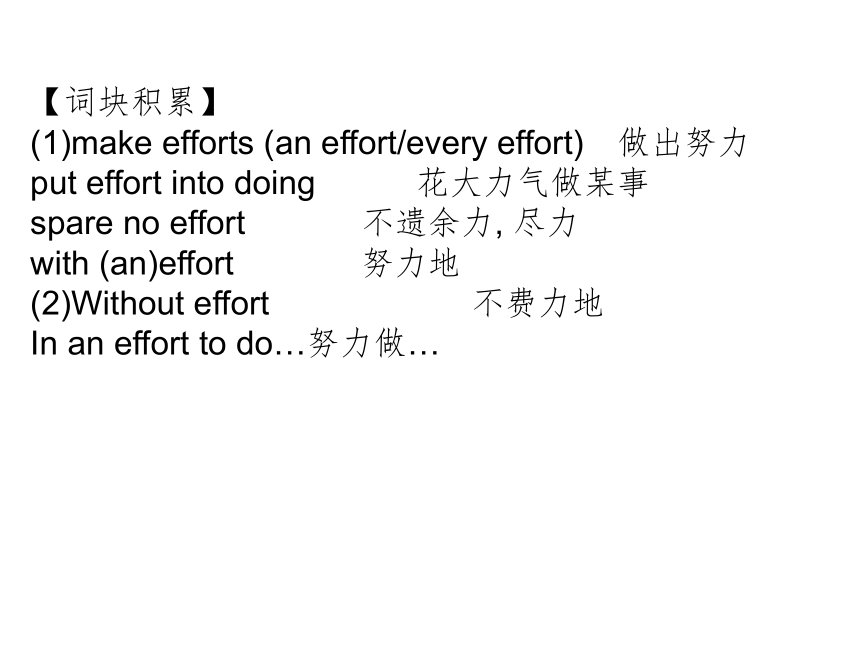
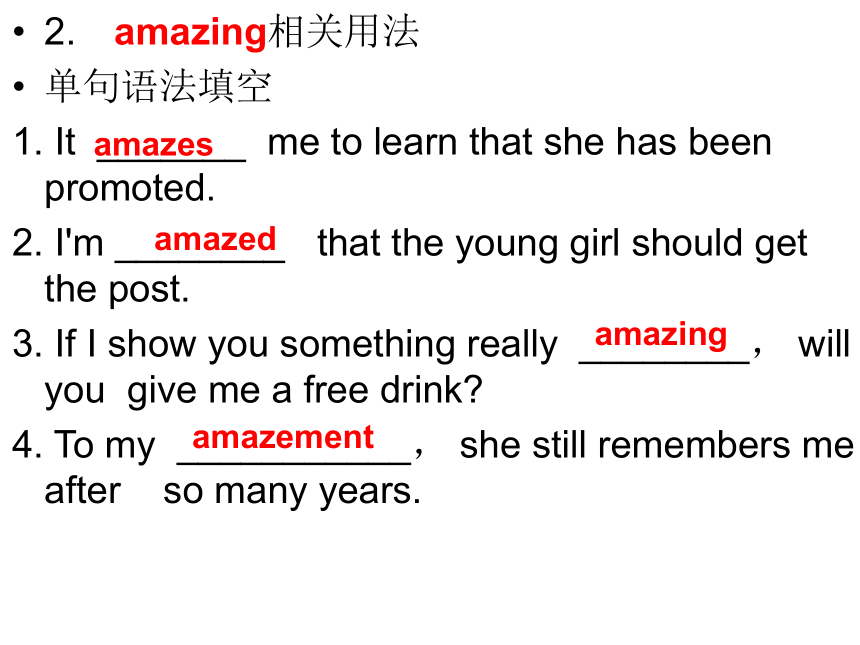
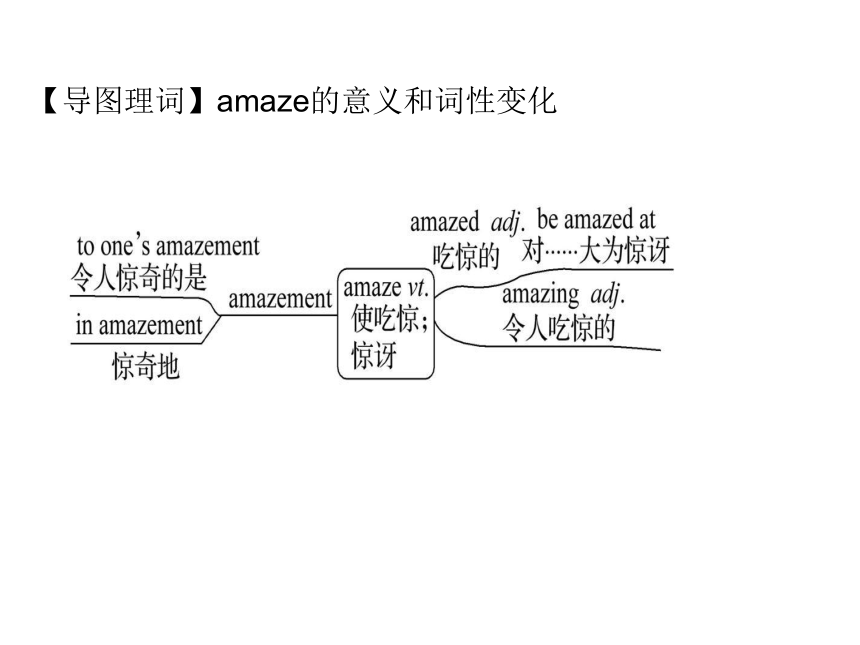
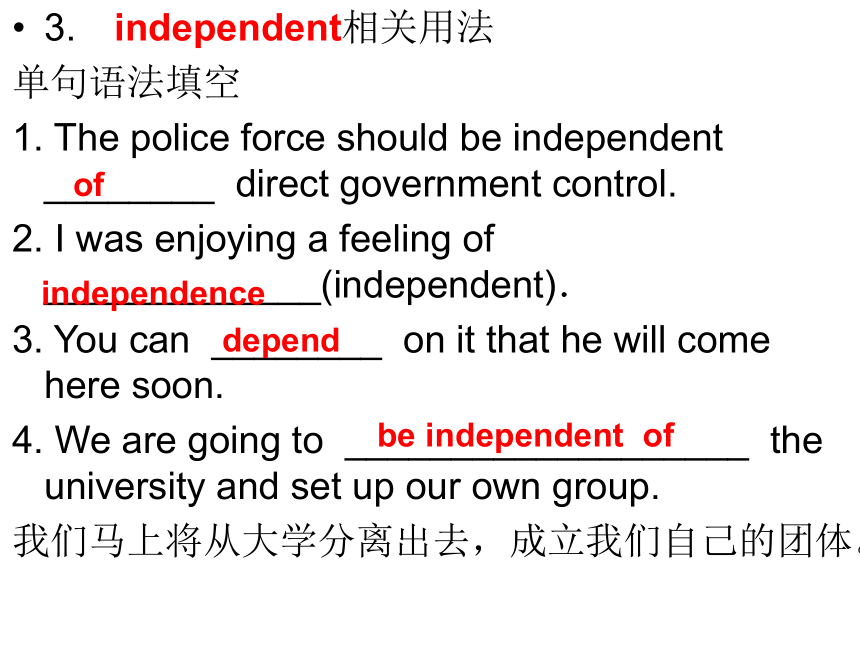
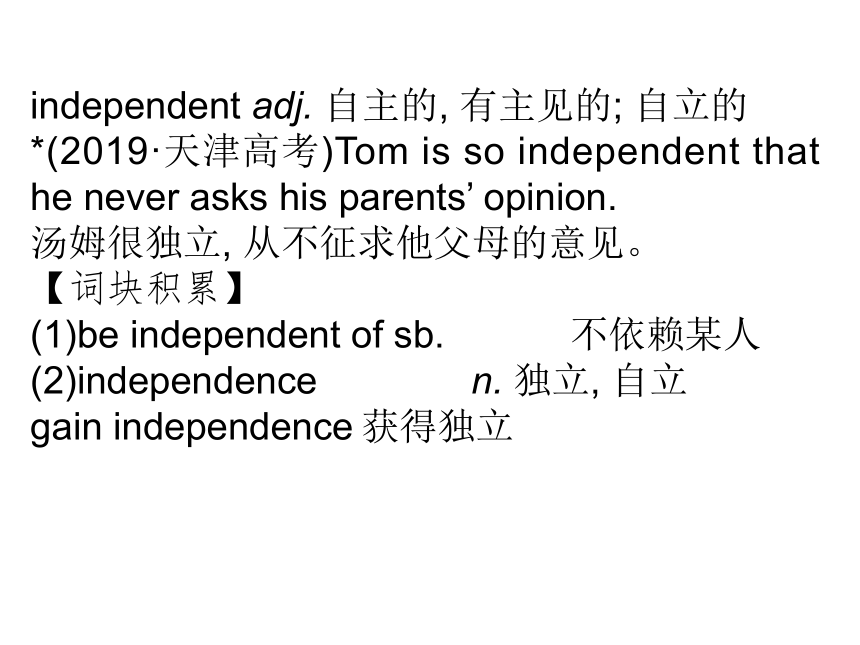
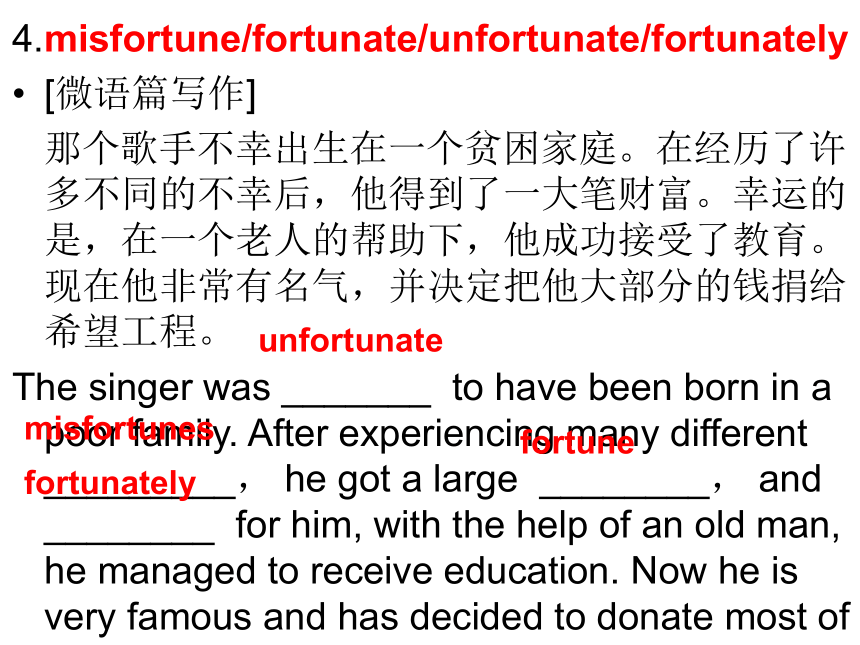
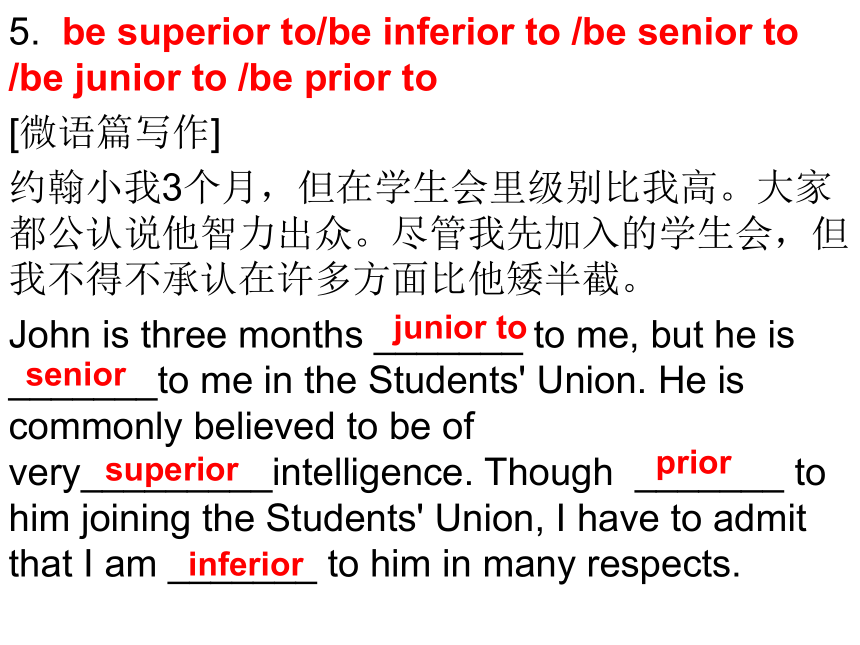
文档简介
(共24张PPT)
必修一 U1 Back to school
Revision of words and grammar
Activity One : Revision of key words and phrases
1. effort相关用法
单句语法 make every effort; in an effort to; make every effort to; with an effort; without effort
1. The local clubs _____________________ to interest more young people.当地俱乐部正在尽一切努力来吸引更多的年轻人。
2. The company has laid off 150 workers ________________ save money.
公司为节省资金遣散了150名工作人员。
3. Hospitals should_________________________ treat the sick.医院应该尽一切努力医治病人。
4. ________________, she managed to stop her- self laughing. 她努力设法忍住了笑。
5. Life is a continuous process of fighting and no one can achieve success _________ ________.
人生是一个不断奋斗的过程,没有人可以毫不费力地取得成功。
are making every effort
in an effort to
make every effort to
With an effort
without effort
【词块积累】
(1)make efforts (an effort/every effort) 做出努力
put effort into doing 花大力气做某事
spare no effort 不遗余力, 尽力
with (an)effort 努力地
(2)Without effort 不费力地
In an effort to do…努力做…
2. amazing相关用法
单句语法填空
1. It _______ me to learn that she has been promoted.
2. I'm ________ that the young girl should get the post.
3. If I show you something really ________, will you give me a free drink
4. To my ___________, she still remembers me after so many years.
amazes
amazed
amazing
amazement
【导图理词】amaze的意义和词性变化
3. independent相关用法
单句语法填空
1. The police force should be independent ________ direct government control.
2. I was enjoying a feeling of _____________(independent).
3. You can ________ on it that he will come here soon.
4. We are going to ___________________ the university and set up our own group.
我们马上将从大学分离出去,成立我们自己的团体。
of
independence
depend
be independent of
independent adj. 自主的, 有主见的; 自立的
*(2019·天津高考)Tom is so independent that he never asks his parents’ opinion.
汤姆很独立, 从不征求他父母的意见。
【词块积累】
(1)be independent of sb. 不依赖某人
(2)independence n. 独立, 自立
gain independence 获得独立
4.misfortune/fortunate/unfortunate/fortunately
[微语篇写作]
那个歌手不幸出生在一个贫困家庭。在经历了许多不同的不幸后,他得到了一大笔财富。幸运的是,在一个老人的帮助下,他成功接受了教育。现在他非常有名气,并决定把他大部分的钱捐给希望工程。
The singer was _______ to have been born in a poor family. After experiencing many different _________, he got a large ________, and ________ for him, with the help of an old man, he managed to receive education. Now he is very famous and has decided to donate most of his money to Project Hope.
unfortunate
misfortunes
fortune
fortunately
5. be superior to/be inferior to /be senior to /be junior to /be prior to
[微语篇写作]
约翰小我3个月,但在学生会里级别比我高。大家都公认说他智力出众。尽管我先加入的学生会,但我不得不承认在许多方面比他矮半截。
John is three months _______ to me, but he is _______to me in the Students' Union. He is commonly believed to be of very_________intelligence. Though _______ to him joining the Students' Union, I have to admit that I am _______ to him in many respects.
junior to
senior
inferior
prior
superior
★senior adj.中学的(招收11或13岁以上学生);级别高的,高级水平的;老年的n.级别(或地位)较高者;较……年长的人;高水平运动员
[用法感知]
①She is senior to me by four years.
她比我大四岁。
2)junior adj.(学校)为11或13岁以下儿童设立的;地位(或级别) n. 职位较低者;青少年运动员
junior high school 初级中学
be senior/junior to 比……年长;
级别/职位比……高
be junior to 比……年少/年幼,级别/职位比……低
superior adj. 优越的;(在品质上)更好的;占优势;更胜一筹;(在级别、重要性或职位上)更高的;有优越感的
n. 上级;级别(或地位、职位)更高的人;
be superior to…比……优越
prior adj.先前的;较早的;在前的;优先的;占先的;较重要的
be prior to… 在….前面
inferior adj.较差的;次的;比不上…的;级别低的;较低的n.不如别人的人;级别(或地位)低的人
be inferior to… 比别人差,次于…,比…地位低
be senior to 比……年长,比……地位/级别
be junior to 比……年少
be superior to……比……优越
be inferior to 比……地位低;
be previous to 先于……
典题赏析:
1) Though She is _____ ___ me by four years, he is _______ ______ me in the company.
虽然我比她小四岁,但在公司他的职位比我低。
2) As a _________ high school student, we should respect those who _____ _______ ______ us.
作为一名高中生,我们应该尊重那些比我们年长的人。
3) ___________ _________that, she had been ill.
在那之前,她一直有病。
4) The present is _____ _______the past.
今胜于昔。
inferior to
junior to
are senior to
Previous to
superior to
senior
6. in time/on time/in no time/at no time/over time/at a time
典题赏析:
1) Experts have been warning _________ of the health risks caused by passive smoking. 【江西卷】
A. at a time B. at one time C. for some time D. for the time
2) —When can I use your computer
—Never! ________________(决不)should you touch it.
3) Don’t come in together, one ___________(一次,每次).
4) If you keep on, you will succeed ________(总有一天,迟早).
5) If you follow the doctor’s advice, you’ll look and feel much better _________(立刻,马上)
C
At no time
at a time
in time
in no time
话题佳句:
Study without thinking leads to confusion; thinking without study ends in puzzlement.
学而不思则罔,思而不学则殆。 ——Confucius (孔子)
2. A journey of a thousand miles begins with a single step.
千里之行始于足下。 —Lao Tzu(老子)
3. Good habits formed at youth make all the difference.
少时养成的良好习惯使人受益终身。 —Aristotle(亚里士多德)
4. Well begun, half done. 良好的开端是成功的一半。
5. A good beginning makes a good ending. 善始者善终。
6. Sow nothing, reap nothing. 春不播,秋无获。
7. Habit is second nature. 习惯成自然。
8. An idle youth, a needy age. 少壮不努力,老大徒伤悲。
9. More haste, less speed. 欲速则不达。
It’s never too old to learn./Live and learn. 活到老学到老。
Easier said than done. 说起来容易做起来难。
Better late than never. 亡羊补牢,犹未晚矣。
An hour in the morning is worth two in the evening.
一日之计在于晨。
All things are difficult before they are easy. 凡事必先易后难
Nothing in the world is difficult for one who sets his mind on it. 世上无难事只怕有心人。
There are a variety of after-class activities in our school, which benefit us a lot.
我们学校有多种课外活动,这些活动对我们很有益。
8. When facing difficulties, I have enough courage to get them over. 面对困难时,我有足够的勇气克服它们。
9. Only by reading widely can we gain more knowledge and broaden our horizons.
只有博览群书,我们才能增长知识,开阔视野。
Activity Two: Categorize [ k t g ra z] (将…分类;把…加以归类) the sentence elements and summarize [ s m ra z] (总结;概括;概述) the general rules;
句子成分
句子是表达思想的基本单位,主要的句子成分( sentence elements)有主语(S)、谓语(V)、宾语(O)、补语(C)、状语(A)、表语(P)、定语(Atr)等。具体如下:
1.主语( subject):指句子所谈论的主体。如:
The teacher gave a speech.
Beijing is the capital of China.
2.谓语(verb):谓语又称为“谓词”,指谓语部分的主要动词,通常说明主语所做的动作或主语的特征和状态。如:
Many students join school clubs.
The weather is nice.
3.宾语( object):通常指动作的对象。有的动后面可以接两个宾语,通常把其中表示人的宾语称为间接宾语( indirect object),把表物的宾语称为直接宾语( direct object)。
如:We should develop good study habits.
Jack offered me some helpful advice.
4.补语( ( complement):补语分为主语补语( subject complement)和宾语补语( (object complement),用来补充说明主语或宾语的特征或情况。如:
He is made chairman of the club.
Listening to music makes me relaxed.
5.状语( (adverbial):修饰动词、形容词、副词或 整个句子。如: Maggie plans her study carefully. Clearly, talking to him is a mistake.
6.表语( predicative) :指连系动词后面的成分,通常说明主语的身份、特征和状态。常见的连系动词有 be, become, feel, look, seem等。如: It’s a lovely day. I feel happy.
7.定语 ( attributive):修饰名词或代词。如:
I went to a large library yesterday
He doesn’t have anything to do at the moment.
句子结构
常见的句子结构( sentence structures)有以下八种:
1.主谓:主语+谓语(SV)。如:The car stopped.
2.主系表:主语+连系动词+表语(SVP),也作主(系)表(SP)。如:Mary seemed pleased.
3.主谓宾:主语+谓语+宾语(SVO)。如:I love ice cream.
4.主谓宾宾:主语+谓语+间接宾语+直接宾语(SVOO)。如:Tom gave me a present.
5.主谓宾补:主语+谓语+宾语+宾语补语(SVOC)。如:We consider the work challenging.
6.主谓状:主语+谓语+状语(SVA)。如:They work hard.
7.主谓宾状:主语+谓语+宾语+状语(SVOA)。如:We like the film very much.
8.存现句:引导词 there引导的句子。如:There is a sports centre in our school.
A. Exploring the rules
◆ The subject and the (1)_____ are necessary parts of a sentence.
◆A transitive verb is always followed by a(n) ( 2)________.
◆Some verbs can have two objects. The indirect object usually refers to a person and the direct object a thing.
◆ The object complement adds more information about the object.
verb
object
Activity Three: Applying the rules
B1. Mark the different elements of each sentence with different symbols. Use the example below to help you.
Example:
You will enjoy ( personal ) growth [at (high) school].
1.(Your) schoolwork will be more challenging.
2. We will give you (more) independence.
3. You should listen [more carefully].
4. (Your) teachers will help you [in (many) ways].
5. You will succeed!
Homework
1.Go over what you learned this class.
2.Review Unit 2.
必修一 U1 Back to school
Revision of words and grammar
Activity One : Revision of key words and phrases
1. effort相关用法
单句语法 make every effort; in an effort to; make every effort to; with an effort; without effort
1. The local clubs _____________________ to interest more young people.当地俱乐部正在尽一切努力来吸引更多的年轻人。
2. The company has laid off 150 workers ________________ save money.
公司为节省资金遣散了150名工作人员。
3. Hospitals should_________________________ treat the sick.医院应该尽一切努力医治病人。
4. ________________, she managed to stop her- self laughing. 她努力设法忍住了笑。
5. Life is a continuous process of fighting and no one can achieve success _________ ________.
人生是一个不断奋斗的过程,没有人可以毫不费力地取得成功。
are making every effort
in an effort to
make every effort to
With an effort
without effort
【词块积累】
(1)make efforts (an effort/every effort) 做出努力
put effort into doing 花大力气做某事
spare no effort 不遗余力, 尽力
with (an)effort 努力地
(2)Without effort 不费力地
In an effort to do…努力做…
2. amazing相关用法
单句语法填空
1. It _______ me to learn that she has been promoted.
2. I'm ________ that the young girl should get the post.
3. If I show you something really ________, will you give me a free drink
4. To my ___________, she still remembers me after so many years.
amazes
amazed
amazing
amazement
【导图理词】amaze的意义和词性变化
3. independent相关用法
单句语法填空
1. The police force should be independent ________ direct government control.
2. I was enjoying a feeling of _____________(independent).
3. You can ________ on it that he will come here soon.
4. We are going to ___________________ the university and set up our own group.
我们马上将从大学分离出去,成立我们自己的团体。
of
independence
depend
be independent of
independent adj. 自主的, 有主见的; 自立的
*(2019·天津高考)Tom is so independent that he never asks his parents’ opinion.
汤姆很独立, 从不征求他父母的意见。
【词块积累】
(1)be independent of sb. 不依赖某人
(2)independence n. 独立, 自立
gain independence 获得独立
4.misfortune/fortunate/unfortunate/fortunately
[微语篇写作]
那个歌手不幸出生在一个贫困家庭。在经历了许多不同的不幸后,他得到了一大笔财富。幸运的是,在一个老人的帮助下,他成功接受了教育。现在他非常有名气,并决定把他大部分的钱捐给希望工程。
The singer was _______ to have been born in a poor family. After experiencing many different _________, he got a large ________, and ________ for him, with the help of an old man, he managed to receive education. Now he is very famous and has decided to donate most of his money to Project Hope.
unfortunate
misfortunes
fortune
fortunately
5. be superior to/be inferior to /be senior to /be junior to /be prior to
[微语篇写作]
约翰小我3个月,但在学生会里级别比我高。大家都公认说他智力出众。尽管我先加入的学生会,但我不得不承认在许多方面比他矮半截。
John is three months _______ to me, but he is _______to me in the Students' Union. He is commonly believed to be of very_________intelligence. Though _______ to him joining the Students' Union, I have to admit that I am _______ to him in many respects.
junior to
senior
inferior
prior
superior
★senior adj.中学的(招收11或13岁以上学生);级别高的,高级水平的;老年的n.级别(或地位)较高者;较……年长的人;高水平运动员
[用法感知]
①She is senior to me by four years.
她比我大四岁。
2)junior adj.(学校)为11或13岁以下儿童设立的;地位(或级别) n. 职位较低者;青少年运动员
junior high school 初级中学
be senior/junior to 比……年长;
级别/职位比……高
be junior to 比……年少/年幼,级别/职位比……低
superior adj. 优越的;(在品质上)更好的;占优势;更胜一筹;(在级别、重要性或职位上)更高的;有优越感的
n. 上级;级别(或地位、职位)更高的人;
be superior to…比……优越
prior adj.先前的;较早的;在前的;优先的;占先的;较重要的
be prior to… 在….前面
inferior adj.较差的;次的;比不上…的;级别低的;较低的n.不如别人的人;级别(或地位)低的人
be inferior to… 比别人差,次于…,比…地位低
be senior to 比……年长,比……地位/级别
be junior to 比……年少
be superior to……比……优越
be inferior to 比……地位低;
be previous to 先于……
典题赏析:
1) Though She is _____ ___ me by four years, he is _______ ______ me in the company.
虽然我比她小四岁,但在公司他的职位比我低。
2) As a _________ high school student, we should respect those who _____ _______ ______ us.
作为一名高中生,我们应该尊重那些比我们年长的人。
3) ___________ _________that, she had been ill.
在那之前,她一直有病。
4) The present is _____ _______the past.
今胜于昔。
inferior to
junior to
are senior to
Previous to
superior to
senior
6. in time/on time/in no time/at no time/over time/at a time
典题赏析:
1) Experts have been warning _________ of the health risks caused by passive smoking. 【江西卷】
A. at a time B. at one time C. for some time D. for the time
2) —When can I use your computer
—Never! ________________(决不)should you touch it.
3) Don’t come in together, one ___________(一次,每次).
4) If you keep on, you will succeed ________(总有一天,迟早).
5) If you follow the doctor’s advice, you’ll look and feel much better _________(立刻,马上)
C
At no time
at a time
in time
in no time
话题佳句:
Study without thinking leads to confusion; thinking without study ends in puzzlement.
学而不思则罔,思而不学则殆。 ——Confucius (孔子)
2. A journey of a thousand miles begins with a single step.
千里之行始于足下。 —Lao Tzu(老子)
3. Good habits formed at youth make all the difference.
少时养成的良好习惯使人受益终身。 —Aristotle(亚里士多德)
4. Well begun, half done. 良好的开端是成功的一半。
5. A good beginning makes a good ending. 善始者善终。
6. Sow nothing, reap nothing. 春不播,秋无获。
7. Habit is second nature. 习惯成自然。
8. An idle youth, a needy age. 少壮不努力,老大徒伤悲。
9. More haste, less speed. 欲速则不达。
It’s never too old to learn./Live and learn. 活到老学到老。
Easier said than done. 说起来容易做起来难。
Better late than never. 亡羊补牢,犹未晚矣。
An hour in the morning is worth two in the evening.
一日之计在于晨。
All things are difficult before they are easy. 凡事必先易后难
Nothing in the world is difficult for one who sets his mind on it. 世上无难事只怕有心人。
There are a variety of after-class activities in our school, which benefit us a lot.
我们学校有多种课外活动,这些活动对我们很有益。
8. When facing difficulties, I have enough courage to get them over. 面对困难时,我有足够的勇气克服它们。
9. Only by reading widely can we gain more knowledge and broaden our horizons.
只有博览群书,我们才能增长知识,开阔视野。
Activity Two: Categorize [ k t g ra z] (将…分类;把…加以归类) the sentence elements and summarize [ s m ra z] (总结;概括;概述) the general rules;
句子成分
句子是表达思想的基本单位,主要的句子成分( sentence elements)有主语(S)、谓语(V)、宾语(O)、补语(C)、状语(A)、表语(P)、定语(Atr)等。具体如下:
1.主语( subject):指句子所谈论的主体。如:
The teacher gave a speech.
Beijing is the capital of China.
2.谓语(verb):谓语又称为“谓词”,指谓语部分的主要动词,通常说明主语所做的动作或主语的特征和状态。如:
Many students join school clubs.
The weather is nice.
3.宾语( object):通常指动作的对象。有的动后面可以接两个宾语,通常把其中表示人的宾语称为间接宾语( indirect object),把表物的宾语称为直接宾语( direct object)。
如:We should develop good study habits.
Jack offered me some helpful advice.
4.补语( ( complement):补语分为主语补语( subject complement)和宾语补语( (object complement),用来补充说明主语或宾语的特征或情况。如:
He is made chairman of the club.
Listening to music makes me relaxed.
5.状语( (adverbial):修饰动词、形容词、副词或 整个句子。如: Maggie plans her study carefully. Clearly, talking to him is a mistake.
6.表语( predicative) :指连系动词后面的成分,通常说明主语的身份、特征和状态。常见的连系动词有 be, become, feel, look, seem等。如: It’s a lovely day. I feel happy.
7.定语 ( attributive):修饰名词或代词。如:
I went to a large library yesterday
He doesn’t have anything to do at the moment.
句子结构
常见的句子结构( sentence structures)有以下八种:
1.主谓:主语+谓语(SV)。如:The car stopped.
2.主系表:主语+连系动词+表语(SVP),也作主(系)表(SP)。如:Mary seemed pleased.
3.主谓宾:主语+谓语+宾语(SVO)。如:I love ice cream.
4.主谓宾宾:主语+谓语+间接宾语+直接宾语(SVOO)。如:Tom gave me a present.
5.主谓宾补:主语+谓语+宾语+宾语补语(SVOC)。如:We consider the work challenging.
6.主谓状:主语+谓语+状语(SVA)。如:They work hard.
7.主谓宾状:主语+谓语+宾语+状语(SVOA)。如:We like the film very much.
8.存现句:引导词 there引导的句子。如:There is a sports centre in our school.
A. Exploring the rules
◆ The subject and the (1)_____ are necessary parts of a sentence.
◆A transitive verb is always followed by a(n) ( 2)________.
◆Some verbs can have two objects. The indirect object usually refers to a person and the direct object a thing.
◆ The object complement adds more information about the object.
verb
object
Activity Three: Applying the rules
B1. Mark the different elements of each sentence with different symbols. Use the example below to help you.
Example:
You will enjoy ( personal ) growth [at (high) school].
1.(Your) schoolwork will be more challenging.
2. We will give you (more) independence.
3. You should listen [more carefully].
4. (Your) teachers will help you [in (many) ways].
5. You will succeed!
Homework
1.Go over what you learned this class.
2.Review Unit 2.
